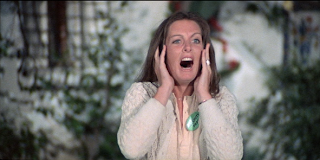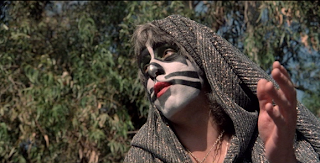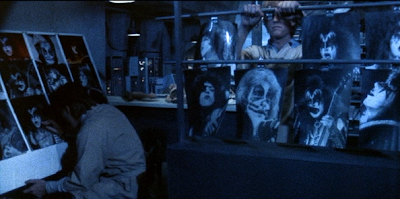 |
| in |
 |
| aka Kiss Meets the Phantom of the Park |

While Kiss
is attacked by Phantoms and they do meet someone (Devereux) who fits the Phantom of the Park description, neither event is a fair description of the events of the movie. (It's almost like naming
Star Wars Episode II "Attack of the Clones" or something.) The
Phantom of the Opera allusion (fired employee, driven mad, vows revenge on park/ performers who've replaced him) makes more sense than the "Attack of the Phantoms," and I wonder if that's why it was marketed under that title everywhere it appeared after its initial broadcast on NBC on October 28, 1978.
 |
| Not that the accuracy of the title is the problem. |
I imagine it would have been better received
if it was a cartoon instead of live-action. (Critically, I mean; as far as viewers went,
accounts vary. It was either the second-most watched TV event of 1978 (behind
Roots) or the 5th. Or maybe neither of those, I can't find any two lists that agree with one another.) But probably not by much. It's a big ol' mess.
 |
| Gene Gene the dancing machine. All of his vocals are modulated with this weird reverb effect which is meant to make him seem otherworldly. Or something. |
 |
| While Peter's are overdubbed entirely. Either on account of his accent or his no-show during ADR looping. Opinions differ. |
 |
| Michael Bell, aka this dude from "Encounter at Farpoint," provides the Catman's dialogue. |
 |
| No one overdubs Ace's vocals, so his impenetrable Bronx-ese comes through as loud and as unclear as ever. |
The screenwriters followed Kiss around for an afternoon to get a sense of how they talked, and Ace, who was sometimes "uncommunicative," said nothing but "Awk!" whenever they tried to engage him. When the script was delivered for the band's approval, Ace threatened not to do the film unless he was given some dialogue. It's funny that the above is how this went down, as no one else in the band sounds anything like themselves (or any rock star anywhere,) yet Space Ace is recognizably himself every time you see him. (Well, except when he's played by his stunt double.)
 |
| "Hi, Curly." |
 |
| And then came Paul. |
I read a couple of reviews out there that do a good job of detailing how and where the film goes off the rails (of which
this is perhaps the best.) If you've never seen it and are wondering if you should do so before reading on, I get the impression that plot detail wasn't a major concern for anyone involved in this production, so I can't see how it would matter for anyone else.
 |
| Among other things, the continuity
is consistently confused. |

The plot and pacing are similarly baffling. I guess it's meant to follow the logic of musicals or
Scooby Doo, where a certain suspension of disbelief is written into the proceedings. (And for the record, had this been a joint venture with
Scooby Doo, that would have improved things considerably.) Viewed through either of those lenses, of course it doesn't matter that the band gets on a merry-go-round in one scene and is on a roller coaster in the next.
But in a musical (or
Scooby Doo) the people on-screen usually sing a song to help the viewer over the hump of these flights of fancy. (Or everyone breaks into a big dance number or whatever you like.) Here, the music of Kiss is played throughout, but rarely does the song chosen match the mood or need of the scene in any way. And they only perform live - well, "live" - at the very end. I think this is the film's only truly unforgivable aspect: the sound design undermines itself at every turn.
Just a few examples:
- I love both Ace's "New York Groove" and Peter's "That's the Kind of Sugar Papa Likes," but why anyone thought either would be good "fight scene" music is the type of decision I'd love to read an explanation for. Like the Ancient Egyptians, though, Gene and Paul prefer to dwell only on their victories, so no commentary track or further explanation is likely forthcoming.
- Devereux, the villain, is shown wandering under the support beams of the roller coaster to the strands of Gene's nostalgic "Mister Make Believe."
But at no point is Devereux written sympathetically, so associating him with that song (and making such a deliberate point of it) undermines his actual function in the story. And it's even repeated at the end, after his one-dimensionality has been well-established.
 |
| He spends most of the film speaking to himself in (bad) super-villain
monologue and asking Kiss, whose progress across the park he is tracking
on his computers, silly questions and toying with them in pointless
ways. |

- Finally, when the robot Kiss doppelgangers take the stage and sing a mirror universe version of "Hotter Than Hell" things get especially confusing.
First, the band's performance is not sufficiently different (or "evil") enough to justify the many shouts of "Stop acting like that! Get off the stage!" we hear from the crowd.
 |
| Despite the staggering terror of these screencaps, there's no reason anyone in the crowd would notice anything was different. |
Second, the switch from crowd disapproval to Nuremberg-esque response is far too abrupt. And
only because the aforementioned "Get off the stage!" shouts are prominent in the mix. One minute the crowd seems like it's going to storm the stage to tear the fake-Kiss limb-from-limb and then in the next overhead shot, thousands of fist-pumping, chanting followers are hypnotized and ready to destroy.
Third, with regard to the
changed lyrics, ("Rip, rip... rip and de-
stroy!") could this be more awkward?
It's time for everyone to listen good / we've taken all we can stand / we've got the power to tear down these walls / it's in the palm of your hand. As with the band's "evil" performance, why would anyone assume from hearing this that the message is to tear down the park? And why would an evil genius so garble his call for the park's destruction?
I could be charitable and say Devereux wanted to pick lyrics that would fit right in on a Kiss record. And it's true - when they moved away from sexual subject matter, Kiss had (and has) difficulty conveying any sort of clear message. But I think that would be crediting Devereux (and the screenwriters) with an attention to detail nothing else in the film demonstrates.
- And so on and so on.
This sort of mixed audiovisual messaging lends some unintentional humor in spots. The scene where Peter and Paul give a poolside serenade to Melissa (who was too Plain Jane for such an honor, according to Peter Criss in his memoir) while Ace and Gene silently look on, is wonderfully weird.
Particularly when Melissa leaves, and Kiss remains behind, maintaining some kind of wordless vigil over the pool area. The eternal lifeguards of rock and roll.
 |
| Deborah Ryan While we're here, let's get the rest of the non-Kiss cast out of the way: |
 |
| Melissa's boyfriend, Sam, is played by Terry Lester, the last of our Trek connections. |
And perennial-80s-movie-presence
Brion James plays one of the Park guards. (It is strongly suggested in Ace's memoir that the late Mr. James was his coke dealer on set.)
 |
| He gets one-half of the immortal exchange: "Oh, that's underground." |
 |
| "Yeah. Waaaaaay underground." |
Apparently following the don't-show-the-monster-until-the-2nd-reel rule, the film opens with most of the above characters interacting and no Kiss. And when Kiss does show up, they materialize over the park like
The Three Storms. They're not just guys playing a concert but actual sci-fi sorcerers with super-powers.
 |
| "Hey, it worked for Magical Mystery Tour!" someone probably said. And no one was around to contradict him. |
 |
| This particular aspect of Phantoms is very 70s Marvel. |
Paul rather adorably wanted to shoot laser beams from his eye throughout the late 70s tours. This never materialized, but they more than make up for it, here, where every other scene has Paul using his special laser-eye power for some purpose or another.
Why they have these powers and how they got them is never satisfactorily explained, but as Peter (presumably thinking This chick is nowhere near hot enough to hear our origin story like this...! the whole time) helpfully explains to Melissa within range of Devereux's listening devices, without his respective Talisman, each member of Kiss is just an "ordinary human."
Is all of this any fun to watch? Your mileage, as they say, may vary. I wish
Nicolas Roeg had directed it. (Or edited it, more precisely.) But I get a kick out of bloated vanity projects of this particular era. And while it be more interesting as a relic of said era than as a story, its re-watchability factor for me is high.
 |
| Peter looked for any chance he could get to storm off set and lock himself in his trailer with then-mistress/ later ex-wife Debra Jensen, a mountain of blow and shopping bags of pharmaceuticals. |
 |
| As a result, as with Ace, a stand-in had to be used. |
As a Kiss fan, I like the fact that the movie exists, as bad as it is,
and I honestly think the best thing these guys could do in 2014 is make a
sequel. Another TV movie, with the original cast, just as goofy, same
location, same everything. Take a page out of Shatner's book and have
some fun with themselves. Yet another project I'd greenlight in a second
were I an eccentric Hollywood type.
 |
| We watch you while you sleep... |
 |
| Unintentional (I imagine) meta-narrative on Kiss in 1978. |



























































